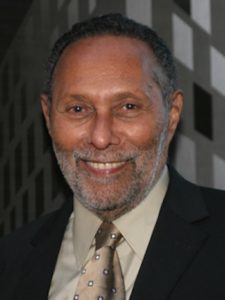
Stuart M. Hall
*Stuart Hall was born on this date in 1932. He was a Black British Marxist sociologist, cultural theorist, and political activist.
Stuart McPhail Hall was born in Kingston, Jamaica, into a middle-class Jamaican family of African, British, Portuguese, Jewish, and Indian descent. He attended Jamaica College, receiving an education modeled after the British school system. In an interview, Hall described himself as a "bright, promising scholar" in these years and his formal education as "a very 'classical' education; outstanding but in very formal academic terms." With the help of sympathetic teachers, he expanded his education to include "T. S. Eliot, James Joyce, Freud, Marx, Lenin and some of the surrounding literature and modern poetry," as well as "Caribbean literature."
Hall's later works reveal that growing up in the pigmentocracy or colorism of the colonial West Indies, where he was of darker skin than much of his family, profoundly affected his views. In 1951, Hall won a Rhodes Scholarship to Merton College at the University of Oxford, where he studied English and obtained an M.A., becoming part of the Windrush generation, the first large-scale emigration of West Indians, as that community was then known. He continued his studies at Oxford by beginning a Ph.D. on Henry James but, galvanized particularly by the 1956 Soviet invasion of Hungary (which saw many thousands of members leave the Communist Party of Great Britain (CPGB) and look for alternatives to previous orthodoxies) and the Suez Crisis, abandoned this in 1957 or 1958 to focus on his political work.
In 1957, he joined the Campaign for Nuclear Disarmament (CND); on a CND march, he met his future wife. From 1958 to 1960, Hall worked as a teacher in a London secondary modern school and adult education, and in 1964 married Catherine Hall, a feminist professor of contemporary British history at University College London, with whom he had two children. He said around this time that he was unlikely to return permanently to the Caribbean. After working on the Universities and Left Review at Oxford, Hall joined others to merge it with The New Reasoner, launching the New Left Review in 1960 with Hall as the founding editor. He left the board of the New Left Review in 1962.
Hall's academic career took off in 1964 after he co-wrote with Paddy Whannel of the British Film Institute (BFI) "one of the first books to make the case for the serious study of film as entertainment", The Popular Arts. As a direct result, he was initially invited to join the Centre for Contemporary Cultural Studies at the University of Birmingham as a research fellow. In 1968, Hall became director of the Centre. He wrote several influential articles in the following years, including Situating Marx: Evaluations and Departures (1972) and Encoding and Decoding in the Television Discourse (1973). He also contributed to the book Policing the Crisis (1978) and coedited the influential Resistance Through Rituals (1975).
Shortly before Margaret Thatcher became Prime Minister in 1979, Hall and Maggie Steed presented It Ain't Half Racist Mum, an Open-Door program by the Campaign Against Racism in the Media (CARM) that tackled racial stereotypes and contemporary British attitudes to immigration.
After he was appointed a professor of sociology at the Open University (OU) that year, Hall published further influential books, including The Hard Road to Renewal (1988), Formations of Modernity (1992), Questions of Cultural Identity (1996), and Cultural Representations and Signifying Practices (1997). Through the 1970s and 1980s, Hall was closely associated with Marxism Today; in 1995, he was a founding editor of Soundings: A Journal of Politics and Culture. Hall was the founding chair of Iniva (Institute of International Visual Arts) and the photography organization Autograph ABP (the Association of Black Photographers).
He retired from the Open University in 1997. He was elected Fellow of the British Academy (FBA) in 2005 and received the European Cultural Foundation's Princess Margarite Award in 2008. Stuart McPhail Hall, Afro Caribbean, died on February 10, 2014, from complications following kidney failure, a week after his 82nd birthday. By his death, he was widely known as the "godfather of multiculturalism." His memoir, Familiar Stranger: A Life Between Two Islands (co-authored with Bill Schwarz), was posthumously published in 2017. After his death, Stuart Hall was described as "one of the most influential intellectuals of the last sixty years."